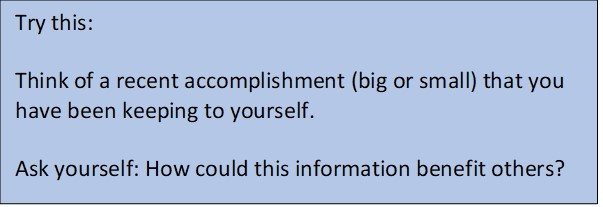ATD Blog
Beyond Bragging: Reframing How Women Can Talk to and About Themselves
Fri Oct 11 2019

Content
It’s widely known that one of the most common ways women sabotage their career success is by failing to let others know about their accomplishments, contributions, gifts, and talents. A 2011 Catalyst study identified that for women, “making achievements known” is the most important factor driving career advancement. Yet, in their newly released bestselling book, How Women Rise , Sally Helgesen and Marshall Goldsmith begin their list of behaviors that keep women stuck with “reluctance to claim achievement.”
It’s widely known that one of the most common ways women sabotage their career success is by failing to let others know about their accomplishments, contributions, gifts, and talents. A 2011 Catalyst study identified that for women, “making achievements known” is the most important factor driving career advancement. Yet, in their newly released bestselling book, How Women Rise, Sally Helgesen and Marshall Goldsmith begin their list of behaviors that keep women stuck with “reluctance to claim achievement.”
Content
Unfortunately for women, this hesitance to own and share their brilliance runs deeply and shows few signs of improving for the next generation.
Unfortunately for women, this hesitance to own and share their brilliance runs deeply and shows few signs of improving for the next generation.
Content
In Grow Like a Girl , a research project conducted earlier this year and designed to explore evolving career development challenges facing women, we asked subjects about the self-talk messages they experienced most frequently. Unsurprisingly, “bragging is not becoming” tops the list of negative self-generated messages for women across the generational spectrum. (Coming in second was “be nice . . . nobody wants to work with a b$%&\*.”)
In Grow Like a Girl, a research project conducted earlier this year and designed to explore evolving career development challenges facing women, we asked subjects about the self-talk messages they experienced most frequently. Unsurprisingly, “bragging is not becoming” tops the list of negative self-generated messages for women across the generational spectrum. (Coming in second was “be nice . . . nobody wants to work with a b$%&\*.”)
Content
What is surprising, however, is the data around just how frequently these self-limiting beliefs come up and how they play out by age. Some of the findings include:
What is surprising, however, is the data around just how frequently these self-limiting beliefs come up and how they play out by age. Some of the findings include:
Content
63 percent of women between 31 and 38 years of age think or say something like “bragging is unbecoming” to themselves often.
63 percent of women between 31 and 38 years of age think or say something like “bragging is unbecoming” to themselves often.
Content
59 percent of women between 23 and 30 years of age run this internal message often.
59 percent of women between 23 and 30 years of age run this internal message often.
Content
58 percent of women between 39 and 49 years of age often hear this negative self-talk.
58 percent of women between 39 and 49 years of age often hear this negative self-talk.
Content
51 percent of women ages 50 and older often play this damaging refrain in their minds.
51 percent of women ages 50 and older often play this damaging refrain in their minds.
Content
A full generation of women have blazed the trail and battled their way through the traditional male-dominated environment to make it more hospitable to future generations of female workers. Yet, that negative “bragging is not becoming” voice is more—not less—pervasive at younger ages.
A full generation of women have blazed the trail and battled their way through the traditional male-dominated environment to make it more hospitable to future generations of female workers. Yet, that negative “bragging is not becoming” voice is more—not less—pervasive at younger ages.
Content
Speculation around the sources of this reluctance to own and share brilliance and accomplishments abound. Is it that women place greater value on competence and believe their good work will speak for itself? Is it anthropologically based, emanating from a time when maintaining parity and evenness was necessary for survival?
Speculation around the sources of this reluctance to own and share brilliance and accomplishments abound. Is it that women place greater value on competence and believe their good work will speak for itself? Is it anthropologically based, emanating from a time when maintaining parity and evenness was necessary for survival?
Content
For many, this idea of not speaking well of one’s self is rooted in a genuine sense of humility. And it’s hard to argue with humility—after all, it’s a virtue. But too many women take it to an unproductive extreme, one that hurts them and others.
For many, this idea of not speaking well of one’s self is rooted in a genuine sense of humility. And it’s hard to argue with humility—after all, it’s a virtue. But too many women take it to an unproductive extreme, one that hurts them and others.
Content
Think about the last time you were complimented or that you complimented a woman about an achievement or talent. What was the response?
Think about the last time you were complimented or that you complimented a woman about an achievement or talent. What was the response?
Content
Oh, that? It was really luck more than anything.
Oh, that? It was really luck more than anything.
Content
Thanks . . . but, you know that it took me a gazillion tries to finally get it right.
Thanks . . . but, you know that it took me a gazillion tries to finally get it right.
Content
I can’t take credit. It was all the team.
I can’t take credit. It was all the team.
Content
Many women have raised the ability deflect positive attention to an art form. They are often generous if giving credit away and exceptionally skilled at promoting others and causes they care deeply about. But drawing attention to their achievements . . . well, that’s a different story.
Many women have raised the ability deflect positive attention to an art form. They are often generous if giving credit away and exceptionally skilled at promoting others and causes they care deeply about. But drawing attention to their achievements . . . well, that’s a different story.
Content
Let’s face it. Bragging is unbecoming. Egotistical, excessive, prideful, self-important boasting is not welcome in any workplace. Consider these points, though:
Let’s face it. Bragging is unbecoming. Egotistical, excessive, prideful, self-important boasting is not welcome in any workplace. Consider these points, though:
Content
Letting your boss know that you successfully completed a challenge is data, not bragging .
Letting your boss know that you successfully completed a challenge is data, not bragging.
Content
Sharing something you’ve learned that can help a coworker is collaboration, not bragging .
Sharing something you’ve learned that can help a coworker is collaboration, not bragging.
Content
Expressing your accomplishments or achievements is inspirational and shares possible sources of innovation, not bragging .
Expressing your accomplishments or achievements is inspirational and shares possible sources of innovation, not bragging.
Content
Offering a customer truthful information about your background so they can use you and your talents to the greatest extent possible is service, not bragging .
Offering a customer truthful information about your background so they can use you and your talents to the greatest extent possible is service, not bragging.
Content
Women do no one a favor by withholding information that may be helpful to them in some way. But, that’s the result of this unnecessary, unproductive, and career-compromising self-talk and humility.
Women do no one a favor by withholding information that may be helpful to them in some way. But, that’s the result of this unnecessary, unproductive, and career-compromising self-talk and humility.
Content
Since “bragging” triggers such bad reactions and resistance for many women, maybe it’s time to rebrand “bragging” as “flagging”. We flag important information for others day in and day out. We raise the flag all the time when there’s something that someone needs to know.
Since “bragging” triggers such bad reactions and resistance for many women, maybe it’s time to rebrand “bragging” as “flagging”. We flag important information for others day in and day out. We raise the flag all the time when there’s something that someone needs to know.
Content
So, it’s as simple as just “flagging it” the next time someone needs to know what you’ve done or could do. Treat it just like any other information you may share. Don’t minimize, apologize, or overanalyze it. Just offer a heads up and values to others in the process.
So, it’s as simple as just “flagging it” the next time someone needs to know what you’ve done or could do. Treat it just like any other information you may share. Don’t minimize, apologize, or overanalyze it. Just offer a heads up and values to others in the process.

Content
If your intention is to offer value, be helpful, and ensure that others are aware of and can take advantage of what you have to offer, it’s not bragging—it’s just flagging what others need to know.
If your intention is to offer value, be helpful, and ensure that others are aware of and can take advantage of what you have to offer, it’s not bragging—it’s just flagging what others need to know.
Content
Women cannot afford to perpetuate this uncomfortable relationship with their achievements. It’s time to replace negative messages like “bragging is not becoming” with constructive messages like “flagging accomplishments and talents helps others and the organization.”
Women cannot afford to perpetuate this uncomfortable relationship with their achievements. It’s time to replace negative messages like “bragging is not becoming” with constructive messages like “flagging accomplishments and talents helps others and the organization.”
